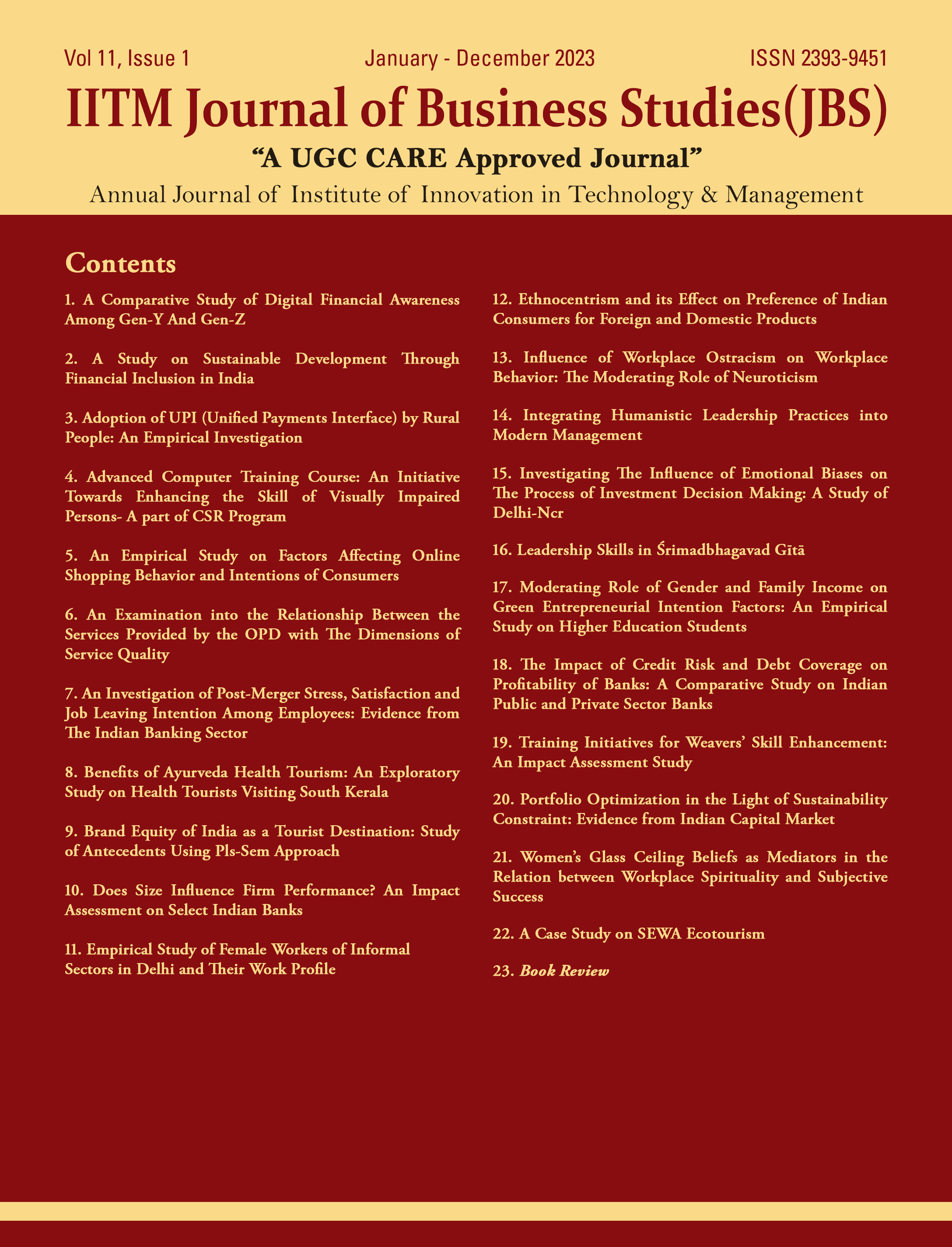Advanced Computer Training Course: An initiative towards enhancing the skill of Visually Impaired Persons- A part of CSR Program
Keywords:
Bibliometric, Financial Planning, Retirement, Investment, SavingAbstract
People are getting more aware about the potential capabilities of a visually impaired person. Thus, with the growing awareness of the abilities of the visually impaired population, few business houses are coming forward in including a visually impaired person in their workforce.
Advanced Computer Training Course(ACTC) conducted by TCS, as a part of their CSR program, to empower the visually impaired population is one of its kind initiative.
Through this paper the researcher aims to analyse the efficiency of CSR programme in empowering the visually impaired population, by conducting survey on 60 trainees from Mumbai centre. The findings states that there has been a significant improvement on the employment front after the training program. It is noteworthy that as much as 60% of the trainees were unemployed prior to the training, against a mere 33.3% unemployment post the training.
References
Abbott, C., & Cribb, A. (2002). Special Schools, Inclusion and the World Wide Web - The emerging research agenda. British Journal of Educational Technology, 32(3), 331-342. doi:10.1111/1467- 8535.00202
Banerjee, S. B. (2008). Corporate Social Responsibility: The Good, the Bad and the Ugly. Association for Critical Sociology, 34(1), 30 pages. doi:10.1177/0896920507084623
Chaudhary, N. K. (2009). Facilitators & Bottlenecks of Corporate Social Responsibility. Indian Journal of Industrial Relations, 44(3), 386-395. Retrieved from https://www.jstor.org/stable/27768211 4. Davies, D. K., Stock, S. E., & Wehmeyer, M. L. (2002). Enhancing Independent Task Performance for Individuals with Mental Retardation Through Use of a Handheld Self-Directed Visual and Audio Prompting System. Education and Training in Mental Retardation and Developmental Disabilities, 37(2), 12 pages.
Dick, T., & Kubiak, E. (1997). Issues and Aids for Teaching Mathematics to the Blind. The Mathematics Teacher, 90(5), 344-349. Retrieved from https://www.jstor.org/stable/27970181 6. G, S. W. (2007). Problems and Prospects in Employment and Job Retention of the Blind and Visually Impaired in the United States: A Future Concern of Special Education. International Journal of Special Education, 22(1), 53-58. Retrieved from http://www.internationaljournalofspecialeducation.com 7. Gupta, S., & Sharma, N. (2009). CSR- A Business Opportunity. International Journal of Business and Globalisation, 44(3), 6. Retrieved from http://www.publishingindia.com › GetBrochure
Hasselbring, T. S., & Williams, C. H. (2000). Use of Computer Technology to Help Students with Special Needs. The Future of Children, 10(2), 102-122. doi:https://doi.org/10.2307/1602691 9. Kachaka, H. (2012). Challenges faced by Women With Visual Impairment in Living a Sustainable Livelihood. Journal of Law and Social Sciences, 1(1), 129-136. doi:https://doi.org/10.53974/unza. jlss.1.1.373
Kingsnorth, S., Healy, H., & Macarthur, C. (2007). Preparing for adulthood: a systematic review of life skill programs for youth with physical disabilities. The Journal of adolescent health, 41(4), 323-332. doi:10.1016/j.jadohealth.2007.06.007.
Nnachebe, G., & Peace, N. (2019). Ability in Disability: Promoting Entrepreneurial Skill Acquisition. World Journal of Entrepreneurial Development Studies, 4(1), 14 pages.
Rajamohan, S., & Devi, E. S. (2020). ROLES AND RESPONSIBILITY OF THE NATIONAL INSTITUTE FOR THE EMPOWERMENT OF PERSON WITH VISUAL DISABILITIES IN INDIA: A STUDY. International Journal of Management, 11(9), 408-417. doi:10.34218/ IJM.11.9.2020.038
Saine, N. L., Lerkkanen, K., Ahonen, T., & Tolvanen, A. (2011). Computer-Assisted Remedial Reading Intervention for School Beginners at Risk for Reading Disability. Child Development, 82(3), 1013- 1028. doi:10.1111/j.1467-8624.2011.01580.x
Sharma, S. (2013). Corporate Social Responsibility in India- The Emerging Discourse & Concerns. Indian Journal of Industrial Relations, 48(4), 582-596. Retrieved from https://www.jstor.org/ stable/23509816
Srivastava, A. K. (2012). Corporate Social Responsibility: A Case Study Of TATA Group. Journal of Business and Management, 3(5), 17-27. doi:10.9790/487X-0351727
Standen, P. J., & Brown, D. J. (2005). Virtual reality in the rehabilitation of people with intellectual disabilities: review. Cyberpsychology & behavior : the impact of the Internet, multimedia and virtual reality on behavior and society, 8(3), 272-282. doi:10.1089/cpb.2005.8.272
Wehmeyer, M. L., & Bolding, N. (2001). Enhanced Self-Determination of Adults with Mental Retardation as an Outcome of Moving to Community-Based Work or Living Environments. Journal of Intellectual Disability Research, 45(5), 371-383. doi:10.1046/j.1365-2788.2001.00342.x
